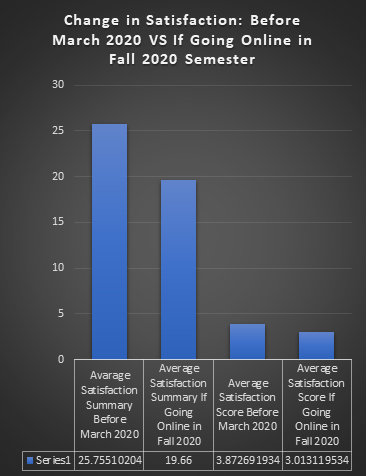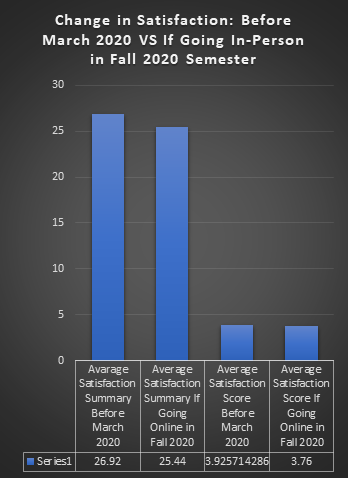Are You Still Satisfied With Your MBA?
- Michal Sofia Liberman
- Aug 11, 2020
- 7 min read
Updated: Aug 29, 2022
How Does the Type of Learning Universities Implement in the 2020-2021 Year for MBA Students Affect Their Satisfaction With the MBA Degree?
Was written by Michal Liberman on a paper for MKT 565.30 – Consumer Insights class at the College of Business, Stony Brook University. August 2020
Background
In March 2020, a health crisis hit the world and forced stay-at-home orders. As a result, many businesses, organizations, institutions, and companies had to close. Many workers, especially white-collared, began working from home and students had to continue their studies online (or stop it entirely). Only essential businesses stayed open, resulting in many businesses declaring bankruptcy and closing permanently (MarketWatch, 2020).
History shows that in past times of crisis, people displayed an increased interest in advanced business degrees, with a positive correlation occurring between business school interest and financial crises (Claireson, 2017). However, the current crisis caused by COVID-19 does not follow past patterns; currently, MBA schools are reporting decreases in the number of applicants to MBA programs (Murray, 2020). Is it because schools are forced to switch to online learning?

When schools across the country switched to online learning, the school performed to the best of their ability in providing MBA students a good experience, even though most faculty had no experience teaching online (McMurtie, 2020). However, many parents and students were unhappy with the online learning environment and reported they will be unwilling to continue their studies in a similar ZOOM class format (McMurtie, 2020). “[A]s with an unhappy marriage, everyone involved agrees that the patched-together system of awkward Zoom classes, glitchy technology, and uncertain expectations, among both students and professors, needs to end” (McMurtie, 2020).
Additionally, a survey (Hesel, 2020) found 66% of college students will expect discounts on tuition and fees for the Fall-Spring of 2020-2021. Some students reported if the Fall 2020 classes are repeated in a similar online-learning environment to the Spring 2020 semester, they will avoid enrolling altogether (McMurtie, 2020).
COVID-19 forced institutions to change their learning environment. In the research conducted through this class, this paper will examine how the type of learning Universities implement in the 2020-2021 year for domestic MBA students affect their satisfaction with the degree experience.

In this research study, the MBA students play the “client role.” The client paid (or sign up) to obtain a specific product following specific expectations (the product being the in-person MBA degree). However, as schools switched to online, the client ended up receiving a different product: online classes via Zoom and limited networking opportunities. How did the change make each client feel? Did it affect the client’s satisfaction with the product? Is the client going to continue their degree with the new product? If the client knows in advance that this is the product they will receive, would the client make other decisions?
Question and Importance

How satisfied are current MBA students with their degree experience? How does the prior March 2020 satisfaction change according to the class format implemented – online vs. in person?
For research purposes, I will consider only online learning and in-person learning (not hybrid) on two groups of MBA students. Group 01 will be asked how satisfied they be if the Fall 2020 semester will take place online. Group 02 will be asked how satisfied they be if the Fall 2020 semester will take place in-person.
Groups will be randomized to reduce selection bias.
This topic is important because MBA programs bring substantial revenue to schools. Based on students’ satisfaction with MBA programs right now, schools can and should adjust to remain relevant and attractive and maintain applicants. Otherwise, serious budget deficits could occur if attrition rates rise substantially.
IV, and DV
The independent variable is the type of learning that Universities implements in the 2020-2021 year for students. There will be two choices – online-only, and in-person only.
The dependent variable is the student’s satisfaction with the MBA experience.
The mediator for this study is the extra benefits that come with each type of learning experience. For example, the networking opportunities that are easily accessible with in-person education increase the quality of experience and thus the satisfaction with the degree.
Experiment Design
To examine people’s satisfaction, I sent a survey and received 147 responses. The first question in the survey asked – Are you currently an MBA student? Those who answered – No ended the survey and I only analyzed the responses of 102 participants that answered – yes. Of those 102 students, 3 were removed for incomplete surveys.
Next, the survey asked the participants about their satisfaction with the MBA experience based on different criteria (quality of education, networking experience, access to information, learning new things, group assignments, in-person classes, and online classes). Satisfaction was determined on a sliding 1-5 scale, with 1 being Extremely Unsatisfied and 5 being Extremely Satisfied.
Finally, the last section was randomized by the survey software. Half of the participants were asked about their satisfaction rate if the school will resume in the Fall 2020 semester in-person, and half of the participants were asked about their satisfaction rate if the school will resume in the Fall 2020 semester online.
**All answers are in the context of the current health climate. Participants were asked if their value proposition changes (based on the type of learning they were assigned to), and how much the change to online format affected their experience.
Results
The main findings indicate that whether the school format will be online or in-person in the Fall 2020 semester, there will be a decrease in satisfaction (5% decrease when going in-person, and a 24% decrease when going online). However, school formatting changing to online in the Fall 2020 semester is generating a far more significant decrease in satisfaction and shows that although people seem to be upset about the Fall 2020 semester as a whole, the majority of them would be more upset if the formatting is online rather than in-person.
Additional interesting findings:
Analyzing people’s responses to their satisfaction before the pandemic in March 2020.

93% of participants reported being “satisfied” (slightly, moderately, extremely) with their MBA experience before the March 2020 pandemic. This shows that most MBA students are happy with their degrees in general.
Although most students reported that the pivot in format caused by the pandemic in 2020 changed their satisfaction with the MBA for the worse (49%), some reported no change (33%), and some even changed for the better (12%), showing that people have different needs. Despite the majority suffering, some people flourish in different formats.
When students were asked how happy they were with different aspects of the MBA, on average the most enjoyable aspect is the access to information (4.196/5), a close second is the quality of education (4.194/5), followed by in-person classes (4.147/5), learning new things (4.071/5), group assignments (3.711/5), networking (3.653/5), and lastly online classes (3.477/5). This indicates that if MBA programs want to improve students’ satisfaction, they should maintain their access to information (which should not be hard in the online world), as well as the quality of education. Additionally, schools should also focus more on improving online classes and networking opportunities. This could come by putting more resources into on boarding teachers to the technology, allowing teachers to be more knowledgeable of the software and online classroom environment.

There seems to be an interesting link between the time of graduation, and the average satisfaction score. The average satisfaction score of students that graduate soon (Fall 2020) is higher than the mean average across all students (27.07 vs. 26.32). Then, the next term (Spring 2021) is very unsatisfied in comparison to the general mean of all students (25.16 vs. 26.32), perhaps because they will have to face uncertain times longer. The next two terms (Fall 2021 and Spring 2022) have a higher satisfaction rate than the mean (29.57 and 26.83 vs 26.32). It is possible that because their graduation is farther away, they feel as if their classes will return to “normal” before graduation.
Analyzing the participants who were asked about going online in the Fall:

50% of the participants were asked how happy they were with their MBA experience up until March 2019. Then they were directed to report how satisfied they will be if the school remains online in the Fall 2020 semester.
The average satisfaction score among those 50 MBA students is 25.8 (the overall average is 26.32). The students that reported a change in their overall MBA experience tend to express that with their score. In conclusion, the survey indicates that the overall satisfaction score decreases substantially if students go online in the Fall 2020 semester.
Analyzing the participants who were asked about going in-person in the Fall:

50% of the participants were asked how happy they were with their MBA experience up until March 2019. Then they were directed to report how satisfied they will be if the school will resume in-person in the Fall 2020 semester.
The average satisfaction score among those 50 MBA students is 26.92 (the overall average is 26.32). Interestingly, the students that reported a change in their overall MBA experience tend to not express it in their score as well. Students that reported a change for the worse seem to improve their score of satisfaction, and students that reported a change for the better seemed to show a decrease in their satisfaction score. However, the decrease/increase is very minor and it is possible that a couple of participants skewed the results for everyone.
References
Claireson, R., 2017. MBA In Times Of Crisis. [online] Access MBA. Available at: <https://www.accessmba.com/articles/view/mba-in-times-of-crisis> [Accessed 12 July 2020].
Cutter, C., 2019. Elite M.B.A. Programs Report Steep Drop In Applications. [online] WSJ. Available at: <https://www.wsj.com/articles/elite-m-b-a-programs-report-steep-drop-in-applications-11571130001> [Accessed 12 July 2020].
MarketWatch. 2020. 5 Industries Most Affected By COVID-19 Lockdown. [online] Available at: <https://www.marketwatch.com/press-release/5-industries-most-affected-by-covid-19-lockdown-2020-04-21> [Accessed 11 July 2020].
McMurtrie, B., 2020. [online] Available at: <https://www-chronicle-com.proxy.library.stonybrook.edu/article/Are-Colleges-Ready-for-a/248710> [Accessed 7 June 2020].
Murray, S., 2020. 3 Ways Coronavirus Impacts MBA Programs. [online] Businessbecause.com. Available at: <https://www.businessbecause.com/news/mba-degree/6866/coronavirus-impact-mba-programs> [Accessed 12 July 2020].
Stern, A., 2008. U.S. Business Schools Feel Fallout From Crisis. [online] U.S. Available at: <https://www.reuters.com/article/us-financial-mba/u-s-business-schools-feel-fallout-from-crisis-idUSTRE4A403F20081105> [Accessed 12 July 2020].
Treisman, R., 2020. NPR Choice Page. [online] Npr.org. Available at: <https://www.npr.org/sections/coronavirus-live-updates/2020/07/06/888026874/ice-foreign-students-must-leave-the-u-s-if-their-colleges-go-online-only-this-fa> [Accessed 12 July 2020].






Comments